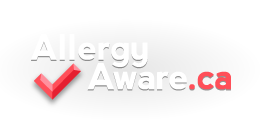
For immediate release
Food Allergy Canada announces new mobile-friendly version of training course for educators
Bilingual resource helps keep kids with food allergies safe at school
TORONTO, ON – September 3, 2015 – Food Allergy Canada (formerly Anaphylaxis Canada) is today announcing an exciting new version of its anaphylaxis course for educators. Developed with Leap Learning Technologies Inc. and in collaboration with the Canadian Society of Allergy and Clinical Immunology, Anaphylaxis in Schools: What Educators Need to Know is now compatible with mobile devices – it can be viewed on a desktop or laptop computer, an iPad, or other mobile device (e.g. tablets, smartphones), and is available at www.allergyaware.ca. This free, medically reviewed, and bilingual online course is designed to help keep students at risk of serious allergic reactions safe at school.
“We are pleased to be broadening the availability of our online Anaphylaxis in Schools course to provide educators with the right information when and where it is most convenient – whether on their tablet, mobile phone, desktop, or laptop computer, ” said Laurie Harada, Executive Director of Food Allergy Canada. “Broad anaphylaxis education – including in our schools – can help improve the quality of life for at-risk children and their families; reduce the number of emergency department visits; and increase the number of Canadians who can help prevent and respond to emergency situations.”
The management of anaphylaxis is a fact of life in schools across the country. Food allergy is the leading cause of potentially life-threatening anaphylactic reactions among children, and has become a growing public health concern in Canada. There is no way of predicting how severe an allergic reaction may be, and to date there is no known cure for food allergy, making avoidance of allergens the only means of staying safe. Avoidance is challenging considering how many times food is eaten at snack and lunch times during a typical school day. In addition to food, educators must be aware of risks regarding medication as well as insect stings, which become especially important during the warmer months.
This new version of the course, which focuses on the prevention, recognition and management of anaphylaxis, uses best practices in instructional design and multimedia learning, and incorporates graphics, videos, mini-case studies, and step-by-step visual guides. Anaphylaxis in Schools creates an engaging learning experience for teachers, administrators and other school staff. Users can review material, complete a short quiz, and print a personalized certificate of completion. The Allergy Aware website also includes resources and information to help people better understand and manage life-threatening allergies.
The Association of Allergists and Immunologists of Quebec reviewed the French language content; and research and evaluation assistance was provided by AllerGen NCE (Allergy, Genes and Environment Network) Inc. and McMaster University. Funding and other support was provided by the governments of Yukon, British Columbia, Alberta, Saskatchewan, Ontario, New Brunswick, and Newfoundland and Labrador, private donors, and premier founding sponsor TELUS.
“The introduction of a mobile-friendly course is timely given the increasing number of people who are turning to their devices for information,” said Jill Schnarr, Vice President of Community Affairs at TELUS. “We are very proud to be continuing our partnership with Food Allergy Canada in support of online anaphylaxis education for schools.”
Food Allergy Canada is also announcing the “Allergy Aware Challenge,” a contest open to Canadian publicly-funded schools. Principals, vice principals or designates of the schools who are intending to enter must submit their course certificate of completion and a contest entry form. There can only be one entry per school. Five lucky schools, one in each of five regions across the country, will win prize packages that include $1,000 towards the purchase of education-related supplies, equipment or programs, and an Anaphylaxis Tool Kit containing educational resources to help raise awareness and education within the school community. The chance to win will depend on the number of entries. The contest runs through to November 30, 2015 and additional information, including information on the five regions, is available at www.foodallergycanada.ca and www.allergyaware.ca.
“Thanks to the support of our public sector partners, private donors, and premier founding sponsor, TELUS, Food Allergy Canada is able to continue to make this innovative course available for free to hundreds of thousands of staff employed by more than 15,000 public schools and thousands of private schools across the country,” said Harada.
About Food Allergy Canada (formerly Anaphylaxis Canada)
Food Allergy Canada is a non-profit charitable organization dedicated to helping Canadians with food allergies and those who care for them. The organization is committed to creating a safer world for people with potentially life-threatening allergies through education, advocacy, and research. The organization’s approach to reducing the risk of allergic reactions in both children and adults is focused on self-management, community engagement, understanding, and respect. For more information, please visit www.foodallergycanada.ca.
For more information please contact:
Christopher Holcroft
Empower Consulting for Food Allergy Canada
416-996-0767
christopherholcroft@hotmail.ca



